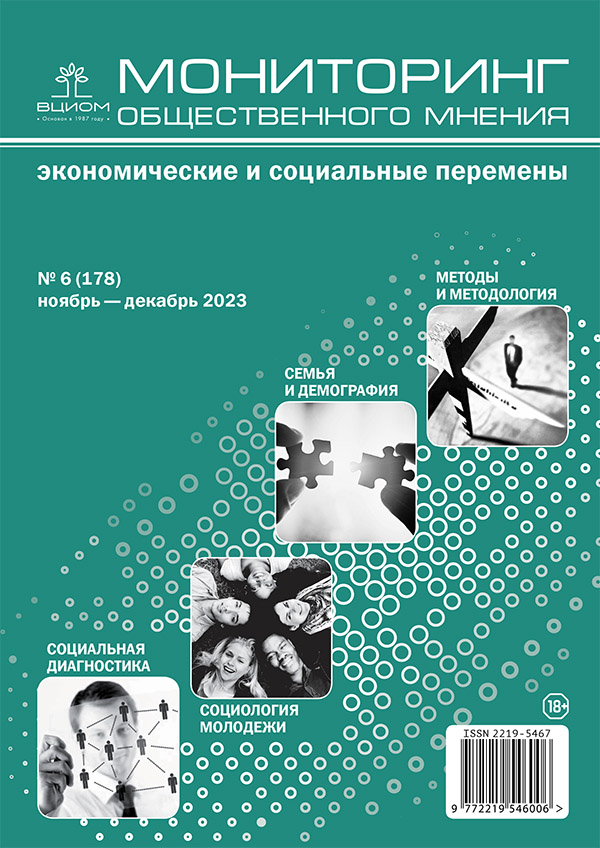Эмоционально нагруженное потребление в современной России. Часть вторая: эмпирические оценки особенностей, факторов и финансовых последствий
DOI:
https://doi.org/10.14515/monitoring.2023.6.2501Ключевые слова:
эмоции, потребление, эмоционально нагруженное потребление, паническое потребление, импульсивное потребление, компульсивное потребление, опросы населенияАннотация
В предшествующей теоретической части статьи был проведен сравнительный анализ трех видов эмоционально нагруженного потребления — панического, импульсивного и компульсивного. В представленной статье на эмпирическом уровне описывается степень распространенности каждого из этих видов потребления в современной России, раскрываются их основные факторы и некоторые следствия. Гипотезы тестируются на данных репрезентативного опроса российского населения в возрасте 18 лет и старше, проведенного НИУ ВШЭ в июне—июле 2023 г. в 55 регионах Российской Федерации в формате личного интервью по месту жительства респондентов (N = 6000). При анализе полученных данных помимо дескриптивной статистики использованы модели логистической регрессии. Обнаружено, что во все три вида эмоционально нагруженного потребления в большей степени вовлечены онлайн-покупатели, а также потребители алкоголя, временно ослабляющего уровень самоконтроля. В импульсивное и компульсивное потребление чаще вовлечены молодые люди, жители средних и крупных городов (кроме Москвы и Санкт-Петербурга), группы с более высоким уровнем душевого дохода, незанятые на рынке труда и те, кто демонстрирует выраженные признаки психологического неблагополучия. Кроме того, в компульсивное потребление более вовлечены женщины и пользователи новых цифровых каналов коммуникации. Показано также, что эмоционально нагруженное потребление способно приводить к серьезным финансовым последствиям, включая наличие неоплаченных кредитов, просроченных задолженностей и долгов частным лицам.
Благодарность. Работа выполнена в Лаборатории экономико-социологических исследований НИУ ВШЭ в рамках проекта «Экономическое поведение домашних хозяйств» при поддержке Программы фундаментальных исследований НИУ ВШЭ. Автор благодарит Т.А. Нестика, О.А. Симонову и З.В. Котельникову за важные замечания по рукописи данной работы.
Библиографические ссылки
Как россияне справляются с новым кризисом: Социально-экономические практики населения / Под ред. Радаева. М.: Издательский дом НИУ ВШЭ, 2023. https://doi.org/10.17323/978-5-7598-2756-6.
Radaev V.V. (ed.) (2023) Coping with a New Crisis: Socio-Economic Practices of the Russian Population. Moscow: HSE Publishing House. https://doi.org/10.17323/978-5-7598-2756-6. (In Russ.)
Bashar A., Ahmad I., Wasiq M. (2013) A Study of Influence of Demographic Factors on Consumer Impulse Buying Behavior. Journal of Management Research. Vol. 13. No. 3. P. 145—154. URL: https://www.indianjournals.com/ijor.aspx?target=ijor:jmr&volume=13&issue=3&article=002 (accessed: 12.12.2023).
Baumeister R.F. (2002) Yielding to Temptation: Self-Control Failure, Impulsive Purchasing, and Consumer Behavior. Journal of Consumer Research. Vol. 28. No. 4. P. 670—676. https://doi.org/10.1086/338209.
Black D.W. (2001). Compulsive Buying Disorder. CNS Drugs. Vol. 15. No. 1. P. 17—27. https://doi.org/10.2165/00023210-200115010-00003.
Fenton-O'Creevy M., Dibb S., Furnham A. (2018) Antecedents and Consequences of Chronic Impulsive Buying: Can Impulsive Buying be Understood as Dysfunctional Self-Regulation? Psychology & Marketing. Vol. 35. No. 3. P. 175—188. https://doi.org/10.1002/mar.21078.
Huan C., Park S., Kang J. (2021) Panic Buying: Modeling What Drives it and How it Deteriorates Emotional Well-Being. Family and Consumer Sciences Research Journal. Vol. 50. No. 2. P. 150—164. https://doi.org/ 10.1111/fcsr.12421.
Kacen J.J., Lee J.A. (2002) The Influence of Culture on Consumer Impulsive Buying Behavior. Journal of Consumer Psychology. Vol. 12. No. 2. P. 163—176. https://doi.org/10.1207/S15327663JCP1202_08.
Kurnaz A. (2022) The Big Five Personality Traits as Antecedents of Panic Buying. Marketing and Management of Innovations. Vol. 3. P. 21—33 https://doi.org/10.21272/mmi.2022.3-02.
Naeem M., Ozuem W. (2021) Customers' Social Interactions and Panic Buying Behavior: Insights from Social Media Practices. Journal of Consumer Behavior. Vol. 20. P. 1191—1203. https://doi.org/10.1002/cb.1925.
Nowak B., Brzóska P., Piotrowski J., Sedikides C., Żemojtel-Piotrowska M., Jonason P. K. (2020) Adaptive and Maladaptive Behavior during the COVID-19 Pandemic: The Roles of Dark Triad Traits, Collective Narcissism, and Health Beliefs. Personality and Individual Differences. Vol. 167. Art. 110232. https://doi.org/ 10.1016/j.paid.2020.110232.
O’Quinn T. C., Faber R. J. (1989) Compulsive Buying: A Phenomenological Exploration. Journal of Consumer Research. Vol. 16. No. 2. P. 147—157. https://doi.org/10.1086/209204.
Prentice C., Quach S., Thaichon P. (2022) Antecedents and Consequences of Panic Buying: The Case of COVID-19. International Journal of Consumer Studies. Vol. 46. No. 1. P. 132—146. https://doi.org/10.1111/ijcs.12649.
Ridgeway N. M., Kukar-Kinney M., Monroe K. B. (2008) An Expanded Conceptualization and a New Measure of Compulsive Buying. Journal of Consumer Research. Vol. 35. No. 4. P. 622—639. https://doi.org/10.1086/591108.
Wang Y., Pan J., Xu Y., Luo J., Wu Y. (2022) The Determinants of Impulsive Buying Behavior in Electronic Commerce. Sustainability. Vol. 14. P. 1—18. https://doi.org/10.3390/su14127500.
Wesseler J. (2020) Storage Policies: Stockpiling Versus Immediate Release. Journal of Agricultural and Food Industrial Organization. Vol. 18. No. 1. P. 1—9. https://doi.org/10.1515/jafio-2019-0055.
Yurchisin Y., Johnson K. K. P. (2004) Compulsive Buying Behavior and Its Relationship to Perceived Social Status Associated with Buying, Materialism, Self-Esteem, and Apparel-Product Involvement. Family and Consumer Sciences Research Journal. Vol. 32. No. 3. P. 291—314. https://doi.org/10.1177/1077727X03261178.
Zhang M., Shi G. (2022) Consumers’ Impulsive Buying Behavior in Online Shopping Based on the Influence of Social Presence. Computational Intelligence and Neuroscience. Art. 6794729. P. 1—8. https://doi.org/10.1155/2022/6794729.
Загрузки
Опубликован
Как цитировать
Выпуск
Раздел
Лицензия
Copyright (c) 2023 Мониторинг общественного мнения: экономические и социальные перемены

Это произведение доступно по лицензии Creative Commons «Attribution-NonCommercial-ShareAlike» («Атрибуция — Некоммерческое использование — На тех же условиях») 4.0 Всемирная.






